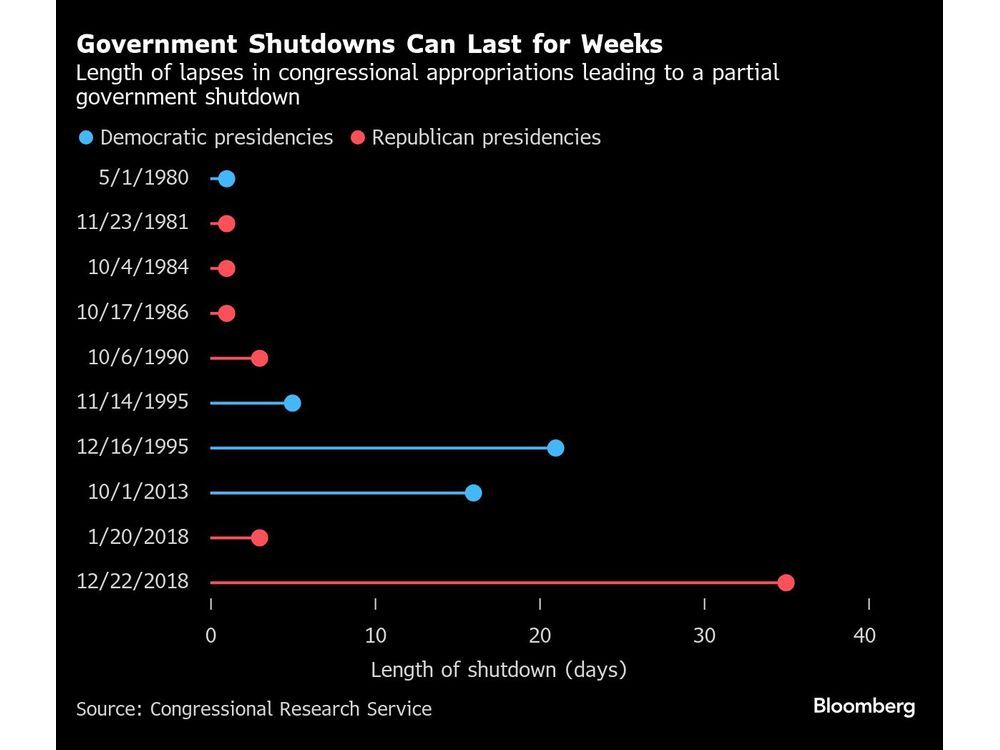Politics
US Government Shutdown Looms, Impacting Key Services and Employees

The potential shutdown of the United States government is increasingly imminent, as Congress has failed to approve new spending legislation before the fiscal year ends on September 30, 2024. This situation could lead to significant disruptions across various federal agencies, with implications for millions of federal employees and essential services.
A government shutdown occurs when Congress does not pass appropriations bills to fund government operations. The upcoming shutdown, if it happens, would be particularly severe, being the first to coincide with the start of a new fiscal year since the Obama administration. Currently, none of the twelve appropriations bills necessary to fund specific agencies have been passed.
In a notable shift, President Donald Trump has indicated plans to permanently dismiss non-essential federal workers instead of the customary temporary furloughs. This directive, combined with a recent instruction from the Office of Management and Budget (OMB) to revise shutdown contingency plans, adds to the uncertainty surrounding the potential impacts of a shutdown.
Operational Continuity and Employee Impacts
Under current laws, certain activities deemed essential for the protection of life and property will continue during a shutdown. This includes military operations, law enforcement, and food inspections. However, most federal employees may face furloughs, which historically have affected about 40% of the workforce. Those deemed essential will still report to work, but they will not receive pay during the shutdown unless Congress acts to retroactively compensate them after the closure ends.
According to the Government Employee Fair Treatment Act of 2019, federal employees typically receive back pay once the shutdown concludes, regardless of whether they worked during the furlough. This creates a financial strain for many workers who rely on their paychecks during the shutdown period.
Travelers may experience delays as the Federal Aviation Administration (FAA) and Transportation Security Administration (TSA) continue to operate essential functions without immediate compensation for their employees. Past shutdowns have seen increased rates of no-shows among air traffic controllers and TSA officers, which could exacerbate delays at airports nationwide.
Impacts on Federal Programs and Services
Social Security and Medicare benefits are expected to continue during a shutdown, alongside ongoing Social Security payments. However, administrative actions involving benefit verifications and corrections may face delays, potentially affecting millions of beneficiaries. The Bureau of Labor Statistics has indicated that the release of critical economic data, such as job reports and inflation figures, may also be postponed, leaving policymakers without vital information to guide economic decisions.
In addition to financial programs, national parks and museums are likely to close their doors to the public. During past shutdowns, national parks have completely shut down, impacting local economies reliant on tourism. The National Park Service has previously left some areas open with limited services, but a full closure could significantly affect the $1 trillion outdoor recreation sector.
Federal courts, including the Supreme Court, are expected to continue operations, but lower courts may struggle to maintain services if funding runs out. The Internal Revenue Service (IRS) will halt most tax administration activities, though tax deadlines will not be postponed.
As the situation develops, the potential shutdown could have far-reaching effects on government operations, employee livelihoods, and public services. With October 6, 2024 marking the start of the new Supreme Court term, the urgency for Congress to reach a funding agreement has never been more critical. The outcome of these negotiations will determine the extent of the shutdown’s impact on federal operations and the American public.
-

 Politics4 weeks ago
Politics4 weeks agoSecwepemc First Nation Seeks Aboriginal Title Over Kamloops Area
-

 World5 months ago
World5 months agoScientists Unearth Ancient Antarctic Ice to Unlock Climate Secrets
-

 Entertainment5 months ago
Entertainment5 months agoTrump and McCormick to Announce $70 Billion Energy Investments
-

 Science5 months ago
Science5 months agoFour Astronauts Return to Earth After International Space Station Mission
-

 Lifestyle5 months ago
Lifestyle5 months agoTransLink Launches Food Truck Program to Boost Revenue in Vancouver
-

 Technology3 months ago
Technology3 months agoApple Notes Enhances Functionality with Markdown Support in macOS 26
-

 Lifestyle3 months ago
Lifestyle3 months agoManitoba’s Burger Champion Shines Again Amid Dining Innovations
-

 Top Stories2 months ago
Top Stories2 months agoUrgent Update: Fatal Crash on Highway 99 Claims Life of Pitt Meadows Man
-

 Politics4 months ago
Politics4 months agoUkrainian Tennis Star Elina Svitolina Faces Death Threats Online
-

 Sports5 months ago
Sports5 months agoSearch Underway for Missing Hunter Amid Hokkaido Bear Emergency
-

 Politics5 months ago
Politics5 months agoCarney Engages First Nations Leaders at Development Law Summit
-

 Technology5 months ago
Technology5 months agoFrosthaven Launches Early Access on July 31, 2025




















